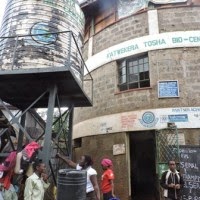Improving Access: Case Study of the Jasho Letu Bio-Centre
Impact of the Kopo Kopo Cashless Payment System
When asked about how
the Jasho Letu bio-centre has impacted his life, Kibera resident Morris Odoyo
said, “I feel better about this. There are less flying toilets.” Created in 2007,
Jasho Letu offers both daily and monthly payment for use of its toilets and
cold showers. One time use of the toilet and shower cost 5 and 10 shillings
respectively, while monthly use costs 150 shillings. In addition to the
bio-centre’s 15 monthly clients, one-time use patrons bring in about 7,000
shillings a week.
One factor
attributing to its success is the introduction of a cashless payment system
that allows for both mobile payment and electronic transfer of cash
transactions. This open-loop platform—called Kopo Kopo—allows customers to pay
for bio-centre services using Safaricom’s M-PESA service to top-up credit on
their mobile phone. With M-PESA, customers can immediately pay for bio-centre
amenities and are not charged any additional fees; rather, Jasho Letu is
charged 1% lumpsum each time the Kopo Kopo transactions are settled to their
bank account.
The Kopo Kopo system also allows
caretakers to electronically submit, transfer, and record cash payments with
the M-PESA mobile wallet platform. Both Kopo Kopo payment methods, mobile and
cash, improve accountability and record-keeping for the bio-centre, as the
caretaker is responsible for significantly less records. Bernice Mmboga, the
caretaker of the Jasho-Letu bio-centre, said that the Kopo Kopo system “makes it
easier.” “I had to get used to it,” she says, “but it’s progressively improved.”
According to Bernice, it was “difficult” and time-consuming to keep handwritten
records of every bio-centre transaction. Now she is accountable for
significantly less records, as bio-centre traffic and payment is automatically
and electronically recorded.
One Jasho Letu member, David
Kihara, says he has seen an improvement in not only recordkeeping but also number
of bio-centre patrons. Although he notes that most still use cash, Kihara says
that the number of customers has increased thanks to the M-PESA option. Kihara
attributes the improvement to M-PESA’s “wide reach.” In 2013 alone there were
17 million M-PESA users in Kenya, many of which live in informal settlements
like Kibera. Because many community members already use M-PESA, paying for
bio-centre services is simple.
Kihara further notes that he has
also seen an improvement in the actual receiving of funds accumulated from Kopo
Kopo. For about a month now Jasho Letu has been using their own Jasho Letu Kopo
Kopo till number to accept payment. Previously there was a delay in the
distribution of money, as the bio-centre was using Umande Trust’s till number.
But with their own till number, Jasho Letu receives payments promptly.
Another major success of the Jasho Letu
bio-centre is the sale of cooking fuel. Jasho Letu currently sells ethanol for
87 shillings per litre, offering a sustainable, inexpensive, and healthier
alternative to charcoal. “It has been very nice,” remarks Kihara. He notes that
because customers often must travel to reach the bio-centre, many prefer not to
use its community cookers. There has been “a very good response” to the
ethanol, according to Kihara, who comments that the fuel “cooks in a shorter
time and lasts longer.”
Evidently both the Kopo Kopo cashless payment system and the
sale of biogas have led Jasho Letu’s bio-centre to go above and beyond water
& sanitation. Along with the cashless payment systems and biogas, Jasho
Letu’s 2nd floor community center provides space for community
collaboration or entertainment. Community based organizations have a space for
meeting, and football fans have a safe opportunity to watch sports. Jasho Letu
hosts football viewings for 20 shillings a game. According to Odoyo, it’s his
“favorite” part of the bio-centre. “It’s safe, I do not have to walk far at
night,” he states. And Odoyo is not the only person benefiting from the Jasho
Letu bio-centre; there are many more, and the numbers are growing.
Written by: Sarah Snead






Comments
Post a Comment